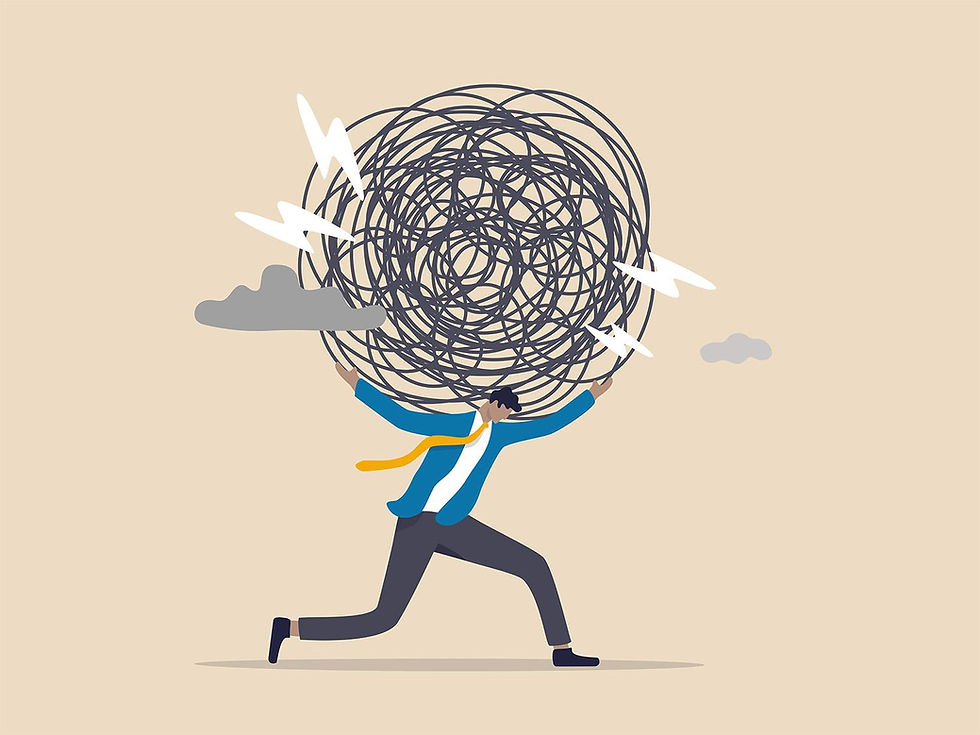Vicarious trauma
- sisucounselling
- Apr 21, 2023
- 3 min read
Vicarious trauma refers to the emotional distress that can result from hearing about or witnessing the traumatic experiences of others, such as clients in therapy.
It can manifest as symptoms like post-traumatic stress disorder (PTSD) including intrusive thoughts, avoidance, emotional numbing, hypervigilance, and sleep disturbances. If you are experiencing the following signs, it may be an indication that you should take a break or seek support:
Emotional exhaustion: You feel overwhelmed or emotionally drained and have a decreased ability to empathise with clients or other people in your life.
Increased stress: You may experience anxiety, irritability, or difficulty concentrating, and may have trouble sleeping or constantly feel on edge.
Negative changes in beliefs or worldview: You may start to feel cynical, hopeless, or negative about the world or people in general, and may find it difficult to maintain a positive outlook.
Blurred boundaries: You may find yourself becoming overly involved with clients or feeling responsible for their problems and may struggle to maintain professional boundaries.
Decreased satisfaction: You may feel less fulfilled by your work or have a reduced sense of purpose and may find yourself questioning your career choice or feeling a lack of motivation.
If you experience any of these signs, it's important to take action to address them. This may involve taking time off work to rest and recharge, seeking support from colleagues or a therapist, or engaging in self-care practices like exercise, meditation, or time in nature. Ultimately, the key is to prioritise your own well-being so that you can continue to provide effective care for your clients.
It's not uncommon for therapists to feel guilty about taking time off when they are experiencing vicarious trauma. However, taking time off is essential for your own well-being, and ultimately, for the well-being of your clients- these are just some of the reasons why it's important to take time off when you are experiencing vicarious trauma. Ultimately, taking time off when you are experiencing vicarious trauma is not a sign of weakness or failure. It's a necessary step to protect your well-being and ensure that you can provide effective care for your clients in the long term.
What can you do to avoid it?
As a counsellor, there are several strategies you can use to avoid getting vicarious trauma.
Practice self-care
We cannot be hypocritical and work with our clients to do this when we don’t do it ourselves. Make sure you are taking care of yourself by getting enough sleep, eating a healthy diet, exercising regularly, and engaging in activities that you enjoy. Establish clear boundaries around your work and personal life. This may include limiting the number of clients you see each day or week or setting limits on the type of client problems that is ethical for you to do in each session. What is affecting you?
Seek supervision
Work with a supervisor or colleague who can provide support and guidance as you navigate challenging cases. Regular supervision can help you stay grounded and prevent vicarious trauma. You need to be honest with your supervisor.
Learn and use coping strategies such as mindfulness, relaxation techniques, and stress reduction exercises to help manage the stress and emotional toll of your work. You already have a tool bag full of these as a head start.
Practice self-reflection
Reflect on your own emotional reactions to your work and consider seeking support when you encounter difficult cases. Stay up to date on research and best practices related to trauma-informed care. This will help you provide effective and compassionate care to your clients while avoiding vicarious trauma.
By practising self-care, setting boundaries, seeking support, developing coping strategies, reflecting on your work, and staying informed, you can reduce your risk of experiencing vicarious trauma as a counsellor. It's important to prioritise your own well-being so that you can provide effective and compassionate care to your clients over the long term.
Written by Linda McLachlan, dip counselling COSCA Linda is a Pluralistic counsellor with over 19 years experience in psychology, counselling and mental health. She is a qualified COSCA trainer training counsellors to diploma level. Linda has helped deliver and write a nationally recognised qualification accredited by SQA, COSCA at level 10. Linda sits on the board of directors of COSCA
read here at counselling directory.

https://www.counselling-directory.org.uk/memberarticles/working-with-vicarious-trauma?_gl=1*1djzsoo*_ga*MjA2MzU4MzUwOC4xNjgyMDgwMTk5*_ga_BMWGCG64PD*MTY4MjA5NTAzNC4yLjEuMTY4MjA5NTA0MC41NC4wLjA.




Comments